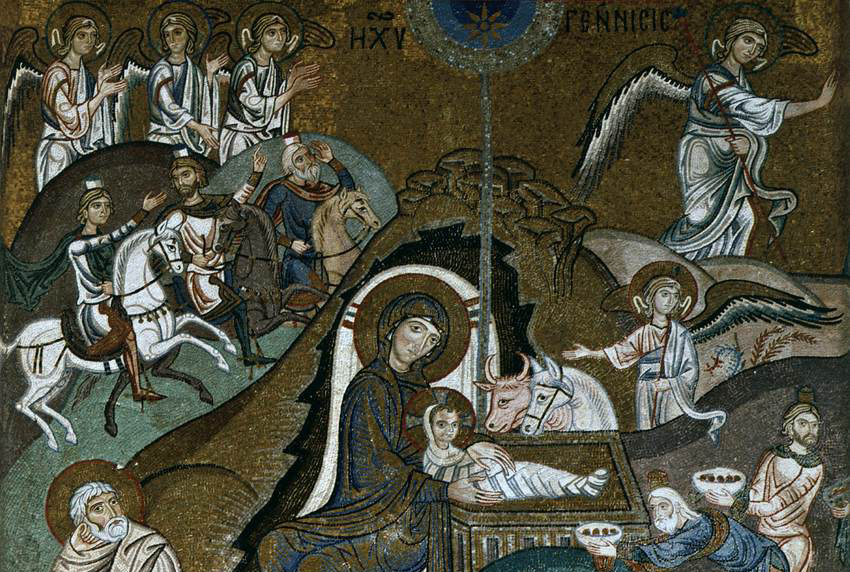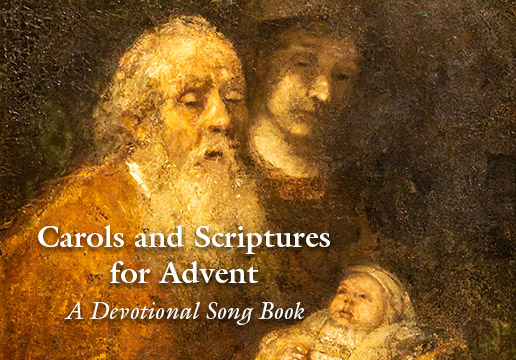
DECEMBER 21
View the Full Advent Calendar
The Friendly Beasts
Artwork:
Nativity Scene, (1150) is a mosaic in the Capello Palatina (Palatine Chapel), Palermo, Sicily, Italy. The mosaic includes all the elements of the Nativity story. In the center an angel shows us Mary and the Christ-child, the stable animals are gazing with eager attention upon the Babe in swaddling clothes. Clockwise from the bottom left: Joseph with his hand to his cheek, the Magi riding swiftly with the angels overhead, the star that guides them, the angel announcing to the shepherds and the shepherds bestowing their gifts.
Carol Text: Robert Davis, 1920;
Carol Melody:13th C. France
Piano accompaniment by Lezlie Taguding
![]()
Jesus our brother, kind and good
Was humbly born in a stable rude
And the friendly beasts around him stood
Jesus our brother, kind and good
![]()
“I,” said the donkey, shaggy and brown
“I carried his mother uphill and down
I carried his mother to Bethlehem town
I,” said the donkey shaggy and brown
![]()
“I,” said the cow, all white and red
“I gave him my manger for his bed
I gave him my hay to pillow his head
I,” said the cow all white and red
![]()
Thus every beast by some good spell
In the stable dark was glad to tell
Of the gift he gave Emmanuel
The gift he gave Emmanuel
“Have this mind among yourselves, which is yours in Christ Jesus, who, though he was in the form of God, did not count equality with God a thing to be grasped, but emptied himself, by taking the form of a servant, being born in the likeness of men. And being found in human form, he humbled himself by becoming obedient to the point of death, even death on a cross.”
- Philippians 2:5-8
Advent Devotional
Animals singing about the gifts they gave to the Great Gift Giver Himself who is born among His creation may seem like a cute and adorable way to bring children into caroling. The carol’s simple and seemingly transparent text, however, belies a very rich history. The tune Orientis Partibus has been attributed to Pierre de Corbeil, Bishop of Sens, France, at about 1222 and sung during the Feast of Circumcision on Jan. 1. By the 13th century the melody was sung during the Fete de l’Ane (Festival of the Donkey), the focus of which was the flight into Egypt by the holy family. During the mass for this festival, a donkey was often led or ridden into the church. At some point over the centuries the scene shifted from the flight into Egypt to the journey to Bethlehem.
Maybe because of its “cuteness” many artists have recorded the song including Peter, Paul & Mary, Burl Ives, Harry Belafonte, Johnny Cash and Garth Brooks on his 1992
platinum-selling album, Beyond the Seasons. The final stanza summarizes that “all the beasts, by some good spell,” were pleased to offer a gift to Emmanuel. The “good spell” has a sense of a magical event in which even the animals comprehended and were engaged in the mystery of Creator coming among His creation.
Whatever you think about its cuteness or its history, this carol calls us to humility, and the meekness of a stable full of animals surrounding the most unpretentious of all, the Lord Himself, Who completely and entirely emptied Himself to do so. Our gratitude is shown in our generosity with our gifts to Him.
Prayer
Dear Lord Jesus,
thank You for absolutely
and utterly emptying Yourself
to be among us.
You are our gift.
Amen.

Lynne Marie Kohm
ProfessorLynne Marie Kohm, serves as the John Brown McCarty Professor of Family Law at Regent University School of Law. She is the author of the books Estate Planning Success for Women and The Christian Guide to Wills, Living Trusts and Estate Planning. Her professional affiliations include and have included the Virginia State Bar Family Law Section Board of Governors, Virginia Bar Association Domestic Relations Council, Christian Legal Society, American Bar Association, Eagle Forum, Alliance Defense Fund, Concerned Women for America, and Bethany Christian Services. She and her husband have two children.




